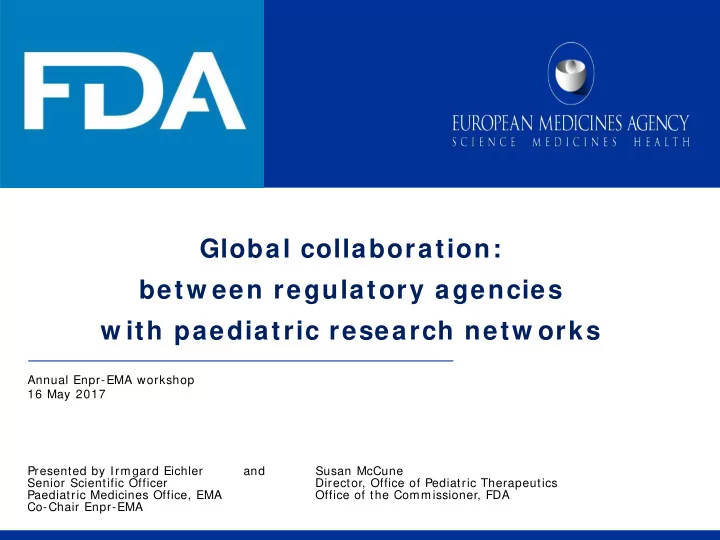

Global collaboration: betw een regulatory agencies w ith paediatric research netw orks Annual Enpr-EMA workshop 16 May 2017 Presented by Irmgard Eichler and Susan McCune Senior Scientific Officer Director, Office of Pediatric Therapeutics Paediatric Medicines Office, EMA Office of the Commissioner, FDA Co-Chair Enpr-EMA
How do regulators address global developm ent in paediatric m edicines? Topics discussed 0 8 / 2 0 0 7 - 0 3 / 2 0 1 7 • We talk to each other frequently Paediatric Cluster N= 5 9 2 • EMA/ FDA Paediatric Cluster together with Health Canada, PMDA (Japan), and TGA General (Australia) topics • Monthly 2-3 hour teleconferences to discuss products/ general issues 148 • More than one approach may be possible, but 444 unnecessary studies are to be avoided Products • Understand rationale when scientific approaches differ • Aim for harmonization to the extent possible 2
Pediatric Cluster • Frequently discussed product issues include scope of pediatric product development, safety, trial design and endpoints • Convergence on approaches have been achieved for 73% of the issues discussed in the past 3 years • In the US, since 1997, over 650 products have been labeled with additional information gathered from pediatric trials. In the EU since the implementation of the Regulation, from 2007 until 2015, • 238 new medicines for use in children and 39 new pharmaceutical forms appropriate for children were authorised. 3
Experience w ith paediatric cluster Topics discussed at paediatric cluster T-conferences Product specific discussions: General discussions: Waiver Endpoints Quality, Non-clinical Paediatric overall development Extrapolation Adult study results - Paediatric study results Meetings/ workshops Indication Joint publications Population , Age groups Study design, Sample size Regulatory action Dose, Endpoints Safety Extrapolation Timelines Long-term follow-up 4
Pediatric Issues to the Pediatric Cluster • Individual divisions have varying levels of pediatric expertise and international experience • The Pediatric Cluster avoids fragmentation of pediatric development activities • The Pediatric Cluster is responsible for ensuring the appropriate pediatric and other subject matter experts are in attendance • The Pediatric Cluster provides additional coordination with PeRC and other divisions 5
6
Frequency of Clinical Trials Issues Discussed at Pediatric Cluster 2007-2015 7
Common Commentary Issues 2012-2017 (N= 25) • Oncology n=10 • Gastroenterology n= 9 • Cardiology n=2 • Neurology n= 1 • Dermatology n=1 • Inborn Errors n=1 • Antimicrobial n=1 8
Pediatric Cluster: Resolving Differences Example: Patient Population • Oncology product to treat a specific type of medulloblastoma • Proposed by sponsor – To EMA: newly diagnosed and relapsed/refractory patients – To FDA: relapsed/refractory patients only • Discussion outcome: – FDA requested the sponsor to study both patient populations 9
Pediatric Cluster: Resolving Differences Example: Timing of Pediatric Studies Drug “X” as add-on to insulin to treat T1DM • • Positions prior to discussion – EMA: after efficacy and safety data are available in adults with T1DM as this add-on drug is the first in its class to be studied in children with T1DM. – FDA: sufficient to have interim adult T1DM data and pediatric PK/PD T2DM data in patients who received this product since there is a significant unmet need (many children and adolescents with T1DM do not achieve their glycemic targets on insulin alone) • Discussion outcome – EMA understood FDA’s rationale and aligned with FDA on earlier timing to address the significant unmet need 10
Achieving a Global Pediatric Approach • Ongoing harmonization of the science is the most useful and productive approach. This will make pediatric product development easier and faster – Pediatric Cluster teleconferences – Joint Working Groups, Workshops and Expert Meetings for extended discussions – Joint Publications – Global Pediatric Trials Networks and Consortia 11
Joint Pediatric Working Groups, Workshops and Expert Meetings • Working Groups – Inflammatory Bowel Disease WG for ulcerative colitis: Jan-Dec 2012 – Inflammatory Bowel Disease WG for Crohn’s Disease: Jan 2014-June 2015 Pediatric Rare Disease WG: new WG to be established as a permanent WG of the Pediatric – Cluster • Workshops – Gaucher Disease Workshop: September 17-18, 2012 – Pediatric Pulmonary Hypertension: June 2017 – Advancing the Development of Pediatric Therapeutics (ADEPT) ADEPT 1: Pediatric Bone Health on June 3, 2014 • • ADEPT 2: Evaluation of Long-term Neurocognitive Development in Pediatrics April 17, 2015 • ADEPT 3: Successes and Challenges of Performing Long-term Pediatric Safety Studies April 13-14, 2016 • ADEPT 4: on Big Data- planned for September 18-19, 2017 • Expert meetings • e.g. diabetes, HIV, rheumatology and osteoporosis • Additional pediatric WGs and Workshops will be established on an ad hoc basis whenever extended in-depth discussions are needed and they will be an extension of the Pediatric Cluster 12
Recommend
More recommend